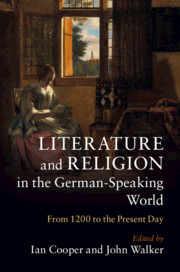Book contents
- Literature and Religion in the German-Speaking World
- Literature and Religion in the German-Speaking World
- Copyright page
- Contents
- Figures
- Contributors
- Introduction
- Chapter 1 Pagan, Christian, Secular
- Chapter 2 Literature and Religion in the Holy Roman Empire 1450–1700
- Chapter 3 German Literature and Religion 1700–1770
- Chapter 4 Literature and Religion in Germany 1770–1830
- Chapter 5 Culture, Society and Secularization
- Chapter 6 Religion in German Modernism 1900–1945
- Chapter 7 German Literature and Religion 1945 to the Present Day
- Notes
- Bibliography
- Index
Chapter 3 - German Literature and Religion 1700–1770
The Shock and Normalization of the Infinite
Published online by Cambridge University Press: 14 September 2019
- Literature and Religion in the German-Speaking World
- Literature and Religion in the German-Speaking World
- Copyright page
- Contents
- Figures
- Contributors
- Introduction
- Chapter 1 Pagan, Christian, Secular
- Chapter 2 Literature and Religion in the Holy Roman Empire 1450–1700
- Chapter 3 German Literature and Religion 1700–1770
- Chapter 4 Literature and Religion in Germany 1770–1830
- Chapter 5 Culture, Society and Secularization
- Chapter 6 Religion in German Modernism 1900–1945
- Chapter 7 German Literature and Religion 1945 to the Present Day
- Notes
- Bibliography
- Index
Summary
This chapter explores a crucial transition in the understanding of infinity during the eighteenth century. Originally a divine attribute, against which the finite is reduced to insignificance (e.g., in Baroque poetry), the infinite becomes a feature to be embraced within the finite world itself. Together with developments in science and mathematics (e.g., the invention of the calculus at the end of the seventeenth century), other cultural spheres played a crucial role in normalizing the ‘anomaly’ (T. S. Kuhn) of the infinite. Chief among them were ‘physico-theology’ and religiously inflected poetry (especially Heinrich Brockes), which celebrated the divine within the grandest and minutest aspects of creation, and Pietism, which explored feelings of the sublime in nature and the soul (especially Friedrich Klopstock).
Keywords
- Type
- Chapter
- Information
- Literature and Religion in the German-Speaking WorldFrom 1200 to the Present Day, pp. 85 - 121Publisher: Cambridge University PressPrint publication year: 2019

